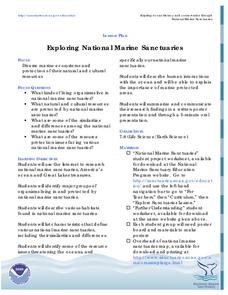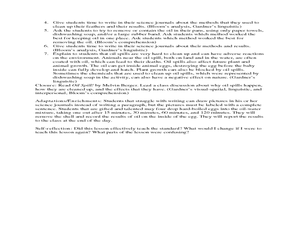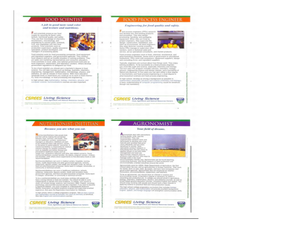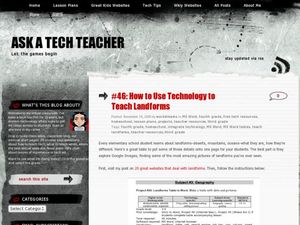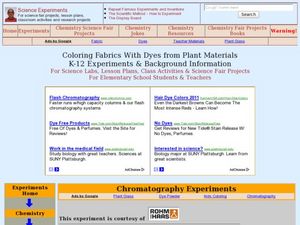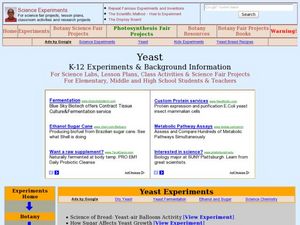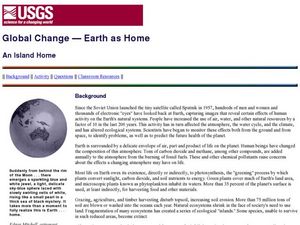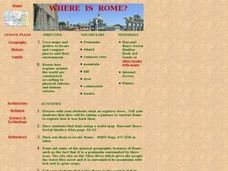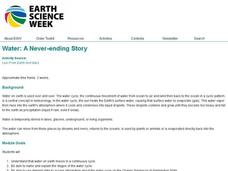Curated OER
Round and Round-The Water Cycle
Students explore the water cycle. In this earth science lesson, students work in small groups to read various books on the water cycle and take notes on chart paper. Students share their notes and teach a younger audience what they have...
Curated OER
Exploring National Marine Sanctuaries
Students research marine ecosystems by creating class presentations. For this oceanography lesson, students research the different locations of marine sanctuaries by identifying them on a transparency map in class. Students create...
Curated OER
Cleaning an Oil Spill
Third graders use oil, feathers, eggs, rubber bands, and more to create a simulated oil spill and then clean it up. In this oil spill lesson plan, 3rd graders discuss what their cleaning process is like and how the oceans are effected...
Curated OER
Aquatic Ecosystems
Students study the diversity of marine life and their habitats. In this aquatic ecosystems instructional activity students complete a lab activity and experiment.
Curated OER
Mapwork: A Place In the News
Learners determine how to find geographic information about places they read about in the news. In this geography lesson, students look at political and physical maps to determine the difference. They access maps online to find the...
Curated OER
The Sun as the Driving Force of the Water Cycle
Learners study the water cycle and how the sun is an important factor. In this water cycle lesson students investigate how to desalinate water and explore the different densities of fresh versus saltwater.
Curated OER
Geographic Features and Human Settlements
Third graders examine geography and settlements. In this geography instructional activity, 3rd graders participate in classroom activities that center on the idea that people settle where there are geographical features that sustain life.
Curated OER
Michigan Food: From Farm to You
Students recognize Michigan on a map and understand how its climate is affected by the Great Lakes. In this Michigan food lesson, students play a trivia game to identify the produce of Michigan. Students relate the climate in each part...
Curated OER
How to Use Technology to Teach Landforms
Students create a landform table on the computer. In this geography lesson, students use Microsoft Word to design a 3 column table. They list different landforms, examples, and attach a picture of each.
Curated OER
Gettysburg Rocks Recycle to Win
Eighth graders use a geologic cross section to study the rock cycle of the Gettysburg battlefield. In this rock cycle lesson, 8th graders connect the rock cycle and continental rifting.
Curated OER
Watch Me Grow
Students observe that plants need air, food, light, and water to survive. In this plant biology lesson, students observe the growth and development of two plants, one is the control plant and the other is denied either air, water, or...
Curated OER
Surface Water and Groundwater
Students examine distribution of water and minerals. In this surface and groundwater lesson, students conduct an experiment with fresh and salt water making hypothesis and drawing conclusions about minerals.
Curated OER
Hurricane Frequency and Intensity
Students examine hurricanes. In this web-based meteorology lesson, students study the relationship between ocean temperature and hurricane intensity. They differentiate between intensity and frequency of hurricanes.
Curated OER
The Water Cycle
Learners simulate the water cycle. In this water cycle lesson, students create a model of the water cycle. Learners draw the water cycle and write a paragraph explaining their drawing.
Curated OER
Coloring Fabrics With Dyes from Plant Materials K-12 Experiments & Background Information
Learners investigate the effects of acid and bases on dyes made with plant materials. In this chromatography lesson students predict color outcomes and complete a lab activity on color combinations.
Curated OER
Water
Students conduct a series of investigations on the unique properties of water. In this general science lesson, students explain what causes water's surface tension. They explain the different stages in the water cycle.
Curated OER
The Fact of Global Warming
Students investigate the harmful impact of global warming by reading news articles. In this environmental care activity, students analyze an article about the Kyoto Protocol and its goal of saving our environment. Students investigate...
Curated OER
Start at the Very Beginning
Students explore ocean ecosystems. In this cross curriculum art and oceans lesson, students create a collage featuring three-finger algae using sand paper, tissue paper, and construction paper.
Curated OER
Bearing the Torch: A Study of Ancient Greece
Second graders research Ancient Greece. In this Ancient Greece lesson, 2nd graders survey the geographical, historical, and cultural aspects of Greece. Students discover stories of Greek mythology and explore the beginning of the Olympic...
Curated OER
Yeast
Students study the characteristics of yeasts. In this biology lesson, students conduct experiments to measure yeast respiration. They discuss the favorable conditions needed for growing them.
Curated OER
Water Cycle
Ninth graders explore ways water moves through various reservoirs on Earth, examine how human activities change water cycle, investigate substances present in water that indicate human activity, and discuss how understanding water cycle...
Curated OER
Global Change- Earth as Home
Students create their own environment. In this environmental protection lesson, students pretend they are the owners of a tropical island. They create jobs for the citizens and develop the island as a model environment.
Curated OER
Where Is Rome?
Third graders discover Ancient Rome through maps and worksheets. In this world history lesson plan, 3rd graders locate Rome on a world map and identify the scope of the Roman Empire. Students label an entire map of Italy after printing...
Curated OER
Water: A Neverending Story
Students investigate the water cycle. For this water cycle science lesson, students participate in a series of activities that demonstrate evaporation, precipitation, and condensation. Students describe their observations using water...
Other popular searches
- Math Lessons on Oceans
- Pre K Lessons on Oceans
- Prue K Lessons on Oceans
- Drama Lessons on Oceans
- Pr K Lessons on Oceans



